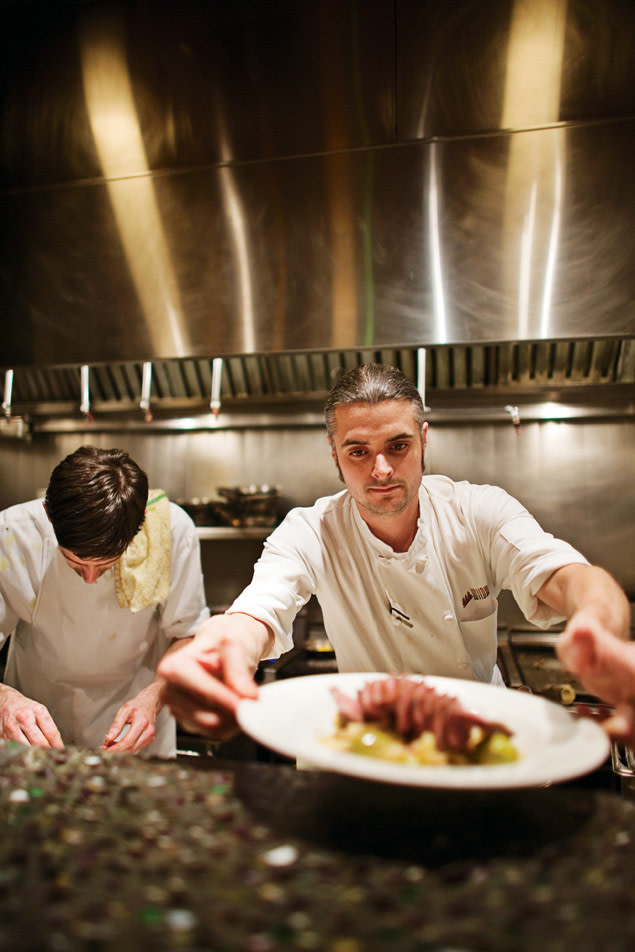Tenure Track

In the competitive sphere of academia, a university’s reputation hangs on the credentials of its tenured professors, but an esteemed roster of professors emeriti doesn’t hurt either—they’re pioneers, after all, the people who, theoretically, shaped the minds of the generation of scholars to come.
The criteria for rating a city known for its cuisine aren’t all that different. For it was only after restaurants like Genoa, Higgins, Wildwood, Paley’s Place and Saucebox had been around long enough—received their tenure, in a sense—that Portland earned accolades as a gastronomic mecca. Some might argue that when Wildwood’s first chef, Cory Schreiber, a native of Portland, emerged on the scene in 1994, the city accepted him as its own visionary dean of the faculty to establish a curriculum of seasonal courses.
So why review a well-oiled institution like Wildwood now, especially when so many new restaurants have opened in the past few months? Because a solid education begins with the classics. But more importantly, in October Schreiber became Wildwood’s and Portland’s culinary professor emeritus, handing over the kitchen torch to Dustin Clark, who honed his skills at Wildwood for the past eight years.
For the most part, Clark and company are still hanging on to their roots. While the restaurant’s interior has received upgrades over the years, the earthy, wood-toned, ’90s aesthetic he inherited remains; as do the loyal patrons, who predictably pack the house right around 5:30 and depart near 7:30 each night. Wildwood still employs one of the most professional waitstaffs in town too, although one night, one waiter exhibited a certain lackadaisical tendency to slump against our booth’s walls while taking our orders. Somewhat surprisingly, the menu has remained largely the same too, which isn’t necessarily a bad thing—indeed, if the skillet-roasted mussels ever disappear, there’ll be a Nob Hill uprising.
Chef Cory Schreiber has handed over the kitchen torch.
What has noticeably changed is the menu’s execution. While the aforementioned mussels still hit the mark, a purée of turnip greens soup was watery one night; at least the chicken liver mousse crouton floating on top offered much-needed richness. An appetizer of “caramelized” baby turnips offered barely cooked roots, although accompanying braised kale, chicken confit and a piquant broth of Banyuls vinegar saved the dish.
Similarly, mushrooms and chestnuts (in true Wildwood loyalty to the seasons) dominated the menu two weeks in a row, but they weren’t always allowed to shine. In a delicate appetizer of roasted chanterelles and chestnuts sautéed with fine shavings of Brussels sprouts and finished with cream and thyme, the ingredients complemented each other swimmingly. But the whole chestnuts in a main course of well-prepared crispy duck leg confit were quite dry. And already flavorful porcinis accompanying a tender, mesquite-roasted chicken were overpowered by tarragon—an herb whose nuances are perennially misunderstood.
On the other hand, the simplest entrées, namely those that hummed the classic ’90s Wildwood tune of ingredient purity, were absolutely harmonious. Braised lamb shoulder set atop baked goat cheese (a culinary “innovation” that made Berkeley’s Alice Waters famous in the 1970s), chanterelles and flageolet beans offered a stunning balance of flavors. Pan-seared chinook salmon was cooked to a perfect medium rare, topped with a sour cherry compote. These are hardly groundbreaking dishes, but they once were, and if Clark can infuse every dish with such vivacity, Wildwood will surely remain a bastion of West Coast fare. Pastry chef Michelle Vernier’s unfussy desserts—a honey-poached pear with cornmeal shortbread and marsala zabaglione, for instance—certainly infuse new life into old dishes.
It may be unfair to expect Clark to bend the rules so early, but it’s hard not to feel disappointed that the successor at one of Portland’s most venerable institutions hasn’t yet made more of a personal mark. It’d be nice to believe that the reason there is always a promising young PhD candidate standing in line to take the place of a soon-to-be professor emeritus is that the student found a way to reimagine the classics, rather than remain content to teach from the master’s notes.




